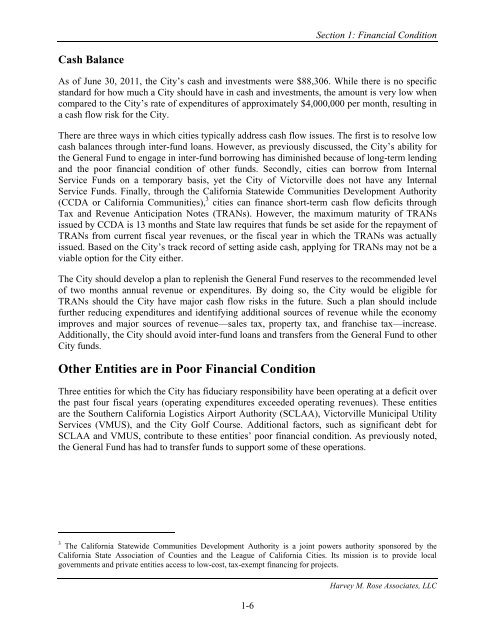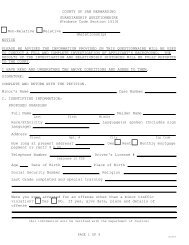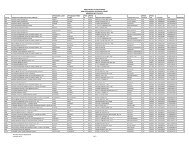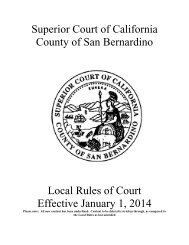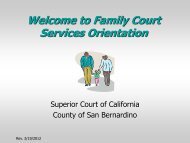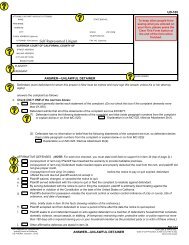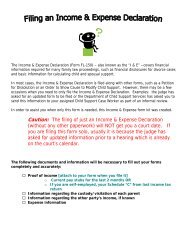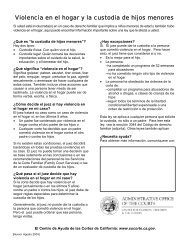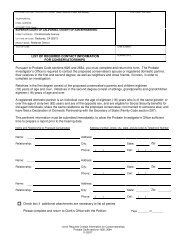FINAL REPORT - San Bernardino Superior Court
FINAL REPORT - San Bernardino Superior Court
FINAL REPORT - San Bernardino Superior Court
Create successful ePaper yourself
Turn your PDF publications into a flip-book with our unique Google optimized e-Paper software.
Section 1: Financial Condition<br />
Cash Balance<br />
As of June 30, 2011, the City’s cash and investments were $88,306. While there is no specific<br />
standard for how much a City should have in cash and investments, the amount is very low when<br />
compared to the City’s rate of expenditures of approximately $4,000,000 per month, resulting in<br />
a cash flow risk for the City.<br />
There are three ways in which cities typically address cash flow issues. The first is to resolve low<br />
cash balances through inter-fund loans. However, as previously discussed, the City’s ability for<br />
the General Fund to engage in inter-fund borrowing has diminished because of long-term lending<br />
and the poor financial condition of other funds. Secondly, cities can borrow from Internal<br />
Service Funds on a temporary basis, yet the City of Victorville does not have any Internal<br />
Service Funds. Finally, through the California Statewide Communities Development Authority<br />
(CCDA or California Communities), 3 cities can finance short-term cash flow deficits through<br />
Tax and Revenue Anticipation Notes (TRANs). However, the maximum maturity of TRANs<br />
issued by CCDA is 13 months and State law requires that funds be set aside for the repayment of<br />
TRANs from current fiscal year revenues, or the fiscal year in which the TRANs was actually<br />
issued. Based on the City’s track record of setting aside cash, applying for TRANs may not be a<br />
viable option for the City either.<br />
The City should develop a plan to replenish the General Fund reserves to the recommended level<br />
of two months annual revenue or expenditures. By doing so, the City would be eligible for<br />
TRANs should the City have major cash flow risks in the future. Such a plan should include<br />
further reducing expenditures and identifying additional sources of revenue while the economy<br />
improves and major sources of revenue—sales tax, property tax, and franchise tax—increase.<br />
Additionally, the City should avoid inter-fund loans and transfers from the General Fund to other<br />
City funds.<br />
Other Entities are in Poor Financial Condition<br />
Three entities for which the City has fiduciary responsibility have been operating at a deficit over<br />
the past four fiscal years (operating expenditures exceeded operating revenues). These entities<br />
are the Southern California Logistics Airport Authority (SCLAA), Victorville Municipal Utility<br />
Services (VMUS), and the City Golf Course. Additional factors, such as significant debt for<br />
SCLAA and VMUS, contribute to these entities’ poor financial condition. As previously noted,<br />
the General Fund has had to transfer funds to support some of these operations.<br />
3 The California Statewide Communities Development Authority is a joint powers authority sponsored by the<br />
California State Association of Counties and the League of California Cities. Its mission is to provide local<br />
governments and private entities access to low-cost, tax-exempt financing for projects.<br />
1-6<br />
Harvey M. Rose Associates, LLC


